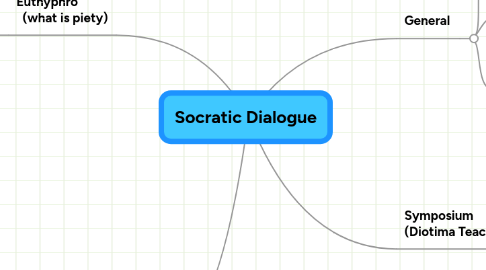
1. Thrasymachus (what is justice?)
1.1. Might Makes Right
1.1.1. Thrasymachus says that "justice is in the interest of the stronger". He thinks that the higher power, wealthier people were in control of the government and the government benefitted them.
1.2. Flaws
1.2.1. The first flaw socrates found in Thrasymachus' idea was the unclear definition of "the stronger". He challenged Thrasymachus on this asking him what he meant and forming a scenario of a stronger stomach forcing Thrasymachus to become more deliberate with his wording as so his words were not misconstrued.
1.2.2. Another problem Socrates found with his thinking was the situation where the ruler in power was a bad ruler and made laws that ended up hurting him and not benefitting him in the way Thrasymachus was talking about.
1.3. Ignorance
1.3.1. In the end, Thrasymachus and others witnessing this discussion admit he is ignorant and does not actaully know what he is talking about.
2. Euthyphro (what is piety)
2.1. Euthyphro believes that which is loved by the gods is holy, and that which is not loved by them is unholy.
2.1.1. Socrates brings up the point that somethings may be loved by one god while it is hated by the other. So, there is conflicting interests and never a universal decision for the gods of what they like and do not like, or, therefore, what is holy and what is unholy.
2.2. Euthyphro then states that the gods love just acts, and so they are holy and that they like these acts because they are holy.
2.2.1. The problem Socrates saw with this was how it was unclear whether or not the deeds were liked by the gods because they were holy or if they were holy because the gods loved them.
2.3. Euthyprho believes that giving service to the gods is holy as with prayers and sacrifice.
2.3.1. With prayer, one is only asking things of the gods.
2.3.2. Since the gods were the ones who created the things on Earth, sacrifice is just giving to the gods what they had created and given to Earth.
3. General
3.1. Definition
3.1.1. Socrates poses a problem in which the person he is talking to has an answer. The will give their answer, their resolution.
3.2. Finding Minor Flaws
3.2.1. Socrates will find minor flaws in the person's thinking and ask questions to challenge the individual. These questions will eventually expose a weakness within their arguement.
3.3. Admitting Ignorance
3.3.1. Eventually, Socrates proves that the solution is imperfect and forces his interlocutor to admit to his ignorance and agrees to find the Truth with Socrates.
4. Symposium (Diotima Teaches)
4.1. The love of physical things and physical beauty is where the idea of love starts.
4.1.1. It then becomes love of virtues as these virtues are discovered.
4.1.1.1. Courage
4.1.1.2. Temperence
4.1.1.3. Prudence
4.1.1.4. Justice
